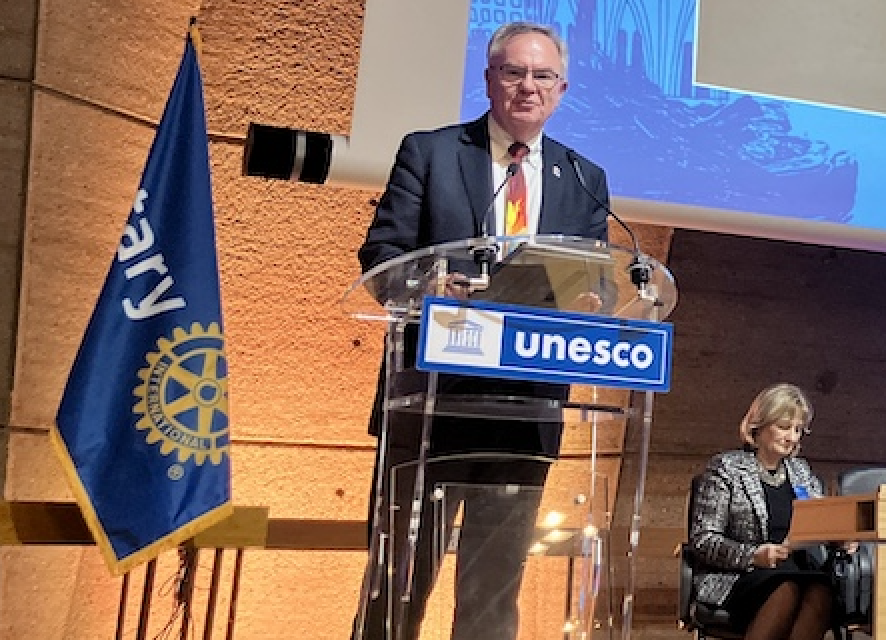by Ariel Miller, ESRAG Newsletter Editor
Rotary’s Green Education Initiatives at UNESCO Conference
Climate Scientist Dr. Kirsten Weber alerted an international audience to Rotary’s rapidly-expanding environmental action during the Rotary Day at UNESCO Conference in Paris on May 4, 2024. Speaking as part of the panel on “Green Education for Peace and the Planet,” she described three initiatives through which Rotarians are teaming up with students and teachers to achieve immediate environmental benefits, raise community awareness of environmental perils and solutions, and develop the skills to become life-long leaders in sustainability. She highlighted that Rotary’s environmental Area of Focus addresses eight of the UN Sustainable Development Goals.
“My speech generated a lot of interest, and I was invited to give further talks at Rotary Clubs around the world,” says Dr. Weber, who has served as Chair of ESRAG’s Great Britain and Ireland Chapter. “People were keen to collaborate with ESRAG. Some interesting encounters I had included:
- Patricia and Mike Werner from Rotary Le Havre in France, who are dedicated to environmental issues at the 2024 Paris Olympic Games. Now, after our meeting, they are working hand-in-hand with ESRAG.
- Jean-Marie Korporaal, who works with students on “Eloquence on Peace” in the south of France. We discussed the importance of education on effective environmental rhetoric, and possible collaborations.
- Positive Peace Activator MaVi Gargiulo (in the photo) – Both of us are physicists, and we exchanged ideas about how researchers and Rotarians can make the world a more nature-friendly place.
- Won Jung Byon, UNESCO Programme Specialist for Green Education in the Section of Education for Sustainable Development, and Stéphane Dugast, a French journalist, who were on the same panel “Green Education for Peace and the Planet.”
Rotary’s Efforts to Bridge the Global Gap in Environmental ‘Green’ Education
Rooted and respected in local communities, Rotary has enormous potential to help close the massive global gap in environmental ‘green’ education. “Only half of national curricula in the world make reference to climate change,” said Weber’s fellow panelist Won Jung Byon.
In her talk for UNESCO, Dr. Weber showcased three initiatives which are being replicated worldwide:
- CAVU’s Climate Innovation Challenge, which provides free curriculum and leadership development for students in grades 3-12. Weber illustrated this by showcasing Kenyan educator Mercy Wambui of Lavington Eco Rotary Club and the award-winning climate videos created by Kenyan students. She added that ESRAG Director Felix Kimani Kariuki is about to introduce an extended version of the curriculum for the Kenyan educational system, from the youngest students through university.
- Lunch out of Landfills in Maryland, USA, launched by Rotarian Joe Richardson, through which students are achieving over 80% diversion of school food waste to composting and hunger programs, and inspiring students and schools across the country to follow suit.
- Rotary’s new Community Action for Fresh Water partnership with the UN Environment Programme, through which students around the world will be joining adults in restoring watersheds and preventing pollution. Rotarians led a highly successful pilot project for this partnership in Kenya.
The Interconnectedness of Environmental Sustainability and Green Education at Rotary Conference

Gordon R McInally, the RI President 23/24 at UNESCO
The conference showcased several other Rotary Areas of Focus: peace, education, and preventing disease. Rotary President Gordon McInally gave the keynote address on Education and Peace and presented Rotary’s Champion of Eradication Award to French President Emmanuel Macron during the session on polio eradication. Dr. Weber told delegates that a safe and resilient environment is essential to the success of all of Rotary’s other humanitarian work.
“The diversity of the event also showed me how varied our demands and opportunities are to contribute to environmental friendliness through education,” she says. “I’d like to illustrate this with the American project ‘Lunch out of Landfills.” While I grew up with waste separation in Germany, we still throw away tons of we still throw away tons of officially expired food just because its size or shape is not ideal. Meanwhile, lunches for teachers on other continents are not even guaranteed.
“After the conference, Gordon invited us to dinner, which provided another chance to engage more deeply with the speakers.,” she adds. “The conference clearly demonstrated how closely environmental sustainability and education are intertwined. Education and access to it are fundamental at all levels. To maintain this access, the environment must be intact. And through education, we learn to value, protect, and support our environment.
“I am grateful to have had the opportunity to represent ESRAG at UNESCO and to provide important insights into our work, which led to exchanges and the creation of collaborations aimed at ultimately creating peace, which clearly includes peace between humans and nature.”
Kirsten Weber is a physicist specialising in atmospheric moisture dynamics, with a PhD from the University of Sheffield, UK. Her current research at the European Centre for Medium-Range Weather Forecasts (ECMWF) focuses on understanding how anthropogenic activities impact land surfaces and weather patterns. As a member of the European Geosciences Union (EGU) Education Committee, Kirsten is dedicated to nurturing future geoscientists worldwide.
She co-founded and co-chaired the Great Britain and Ireland ESRAG Chapter, embracing the challenge of building a sustainable world by establishing ties between science, politics, industry, and communities. As a Fellow at the Grantham Centre for Sustainable Futures, Kirsten advocates for everyone to use their responsibility to make the difference we wish to see. You can contact her at [email protected]
Photos courtesy of Kirsten Weber

